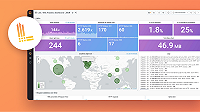This is documentation for the next version of Grafana Alloy Documentation. For the latest stable release, go to the latest version.
otelcol.exporter.googlecloudpubsub
Community: This component is developed, maintained, and supported by the Alloy user community. Grafana doesn’t offer commercial support for this component. To enable and use community components, you must set the
--feature.community-components.enabledflag totrue.Refer to Community components for more information.
otelcol.exporter.googlecloudpubsub accepts metrics, traces, and logs from other otelcol components and sends it to Google Cloud Pub/Sub Topic.
Note
otelcol.exporter.googlecloudpubsubis a wrapper over the upstream OpenTelemetry Collectorgooglecloudpubsubexporter. Bug reports or feature requests will be redirected to the upstream repository, if necessary.
You can specify multiple otelcol.exporter.googlecloudpubsub components by giving them different labels.
Usage
otelcol.exporter.googlecloudpubsub "<LABEL>" {
project = "<PROJECT-ID>"
topic = "projects/<PROJECT-ID>/topics/<TOPIC-NAME>"
}Authenticating
Refer to the Google Cloud Pub/Sub Exporter and Google Cloud Exporter documentation for more detailed information about authentication.
Arguments
You can use the following arguments with otelcol.exporter.googlecloudpubsub:
Blocks
You can use the following blocks with otelcol.exporter.googlecloudpubsub:
debug_metrics
The debug_metrics block configures the metrics that this component generates to monitor its state.
The following arguments are supported:
disable_high_cardinality_metrics is the Alloy equivalent to the telemetry.disableHighCardinalityMetrics feature gate in the OpenTelemetry Collector.
It removes attributes that could cause high cardinality metrics.
For example, attributes with IP addresses and port numbers in metrics about HTTP and gRPC connections are removed.
Note
If configured,
disable_high_cardinality_metricsonly applies tootelcol.exporter.*andotelcol.receiver.*components.
ordering
The following arguments are supported:
retry_on_failure
The retry_on_failure block configures how failed requests to Datadog are retried.
The following arguments are supported:
When enabled is true, failed batches are retried after a given interval.
The initial_interval argument specifies how long to wait before the first retry attempt.
If requests continue to fail, the time to wait before retrying increases by the factor specified by the multiplier argument, which must be greater than 1.0.
The max_interval argument specifies the upper bound of how long to wait between retries.
The randomization_factor argument is useful for adding jitter between retrying Alloy instances.
If randomization_factor is greater than 0, the wait time before retries is multiplied by a random factor in the range [ I - randomization_factor * I, I + randomization_factor * I], where I is the current interval.
If a batch hasn’t been sent successfully, it’s discarded after the time specified by max_elapsed_time elapses.
If max_elapsed_time is set to "0s", failed requests are retried forever until they succeed.
sending_queue
The sending_queue block configures an in-memory buffer of batches before data is sent to the HTTP server.
The following arguments are supported:
The blocking argument is deprecated in favor of the block_on_overflow argument.
When block_on_overflow is true, the component will wait for space. Otherwise, operations will immediately return a retryable error.
When enabled is true, data is first written to an in-memory buffer before sending it to the configured server.
Batches sent to the component’s input exported field are added to the buffer as long as the number of unsent batches doesn’t exceed the configured queue_size.
queue_size determines how long an endpoint outage is tolerated.
Assuming 100 requests/second, the default queue size 1000 provides about 10 seconds of outage tolerance.
To calculate the correct value for queue_size, multiply the average number of outgoing requests per second by the time in seconds that outages are tolerated. A very high value can cause Out Of Memory (OOM) kills.
The sizer argument could be set to:
requests: number of incoming batches of metrics, logs, traces (the most performant option).items: number of the smallest parts of each signal (spans, metric data points, log records).bytes: the size of serialized data in bytes (the least performant option).
The num_consumers argument controls how many readers read from the buffer and send data in parallel.
Larger values of num_consumers allow data to be sent more quickly at the expense of increased network traffic.
If an otelcol.storage.* component is configured and provided in the queue’s storage argument, the queue uses the
provided storage extension to provide a persistent queue and the queue is no longer stored in memory.
Any data persisted will be processed on startup if Alloy is killed or restarted.
Refer to the
exporterhelper documentation in the OpenTelemetry Collector repository for more details.
watermark
The following arguments are supported:
Exported fields
The following fields are exported and can be referenced by other components:
input accepts otelcol.Consumer data for any telemetry signal , including metrics, logs, and traces.
Component health
otelcol.exporter.googlecloudpubsub is only reported as unhealthy if given an invalid configuration.
Debug information
otelcol.exporter.googlecloudpubsub doesn’t expose any component-specific debug information.
Example
This example scrapes logs from local files through a receiver for conversion to OpenTelemetry format before finally sending them to Pub/Sub.
This configuration includes the recommended memory_limiter and batch plugins, which avoid high reporting latency and ensure the collector stays stable by dropping telemetry when memory limits are reached.
local.file_match "logs" {
path_targets = [{
__address__ = "localhost",
__path__ = "/var/log/{syslog,messages,*.log}",
instance = constants.hostname,
job = "integrations/node_exporter",
}]
}
loki.source.file "logs" {
targets = local.file_match.logs.targets
forward_to = [otelcol.receiver.loki.gcp.receiver]
}
otelcol.receiver.loki "gcp" {
output {
logs = [otelcol.processor.memory_limiter.gcp.input]
}
}
otelcol.processor.memory_limiter "gcp" {
check_interval = "1s"
limit = "200MiB"
output {
metrics = [otelcol.processor.batch.gcp.input]
logs = [otelcol.processor.batch.gcp.input]
traces = [otelcol.processor.batch.gcp.input]
}
}
otelcol.processor.batch "gcp" {
output {
metrics = [otelcol.exporter.googlecloudpubsub.default.input]
logs = [otelcol.exporter.googlecloudpubsub.default.input]
traces = [otelcol.exporter.googlecloudpubsub.default.input]
}
}
otelcol.exporter.googlecloudpubsub "default" {
project = "my-gcp-project"
topic = "projects/<my-gcp-project>/topics/my-pubsub-topic"
}Compatible components
otelcol.exporter.googlecloudpubsub has exports that can be consumed by the following components:
- Components that consume OpenTelemetry
otelcol.Consumer
Note
Connecting some components may not be sensible or components may require further configuration to make the connection work correctly. Refer to the linked documentation for more details.



